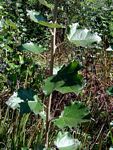| Home | > | List of families | > | Salicaceae | > | Populus | > | × canescens |
Populus × canescens
Selected images: Click on each image to see a larger version and details of the record View all images (2)
Detailed records: Display species records QDS maps by: Google Maps Point records by Google Maps
Species details: Click on each item to see an explanation of that item (Note: opens a new window)
| Synonyms: | |
| Common names: | Grey poplar (English) |
| Frequency: | Locally common in wet habitats in and around Harare; rare elsewhere |
| Status: | Introduced |
| Description: |
A small to medium-sized tree, but in our area usually forming dense, large stands of erect, rather spindly suckers, attaining c. 5 m in height. Leaves: petiole subterete; lamina (of suckers) 5-9 × 6-10 cm, broadly ovate, subglabrous and dark green above, greyish-tomentose beneath; without glands on the lamina; base cordate to truncate; margin irregularly serrate. |
| Notes: | It is a hybrid (P. alba × P. tremula) originating from Europe and Asia. It was introduced for matchwood and also used for furniture. It has become naturalised and is a declared weed in South Africa. |
| Derivation of specific name: | canescens: grey-pubescent |
| Habitat: | Along streams, rivers and vleis. |
| Altitude range: (metres) | |
| Flowering time: | |
| Worldwide distribution: | Europe, east to the Caucasus |
| Zimbabwe distribution: | W,C,E |
| Growth form(s): | Tree, shrub over 2 m. |
| Endemic status: | |
| Red data list status: | |
| Insects associated with this species: | |
| Spot characters: | Display spot characters for this species |
| Images last updated: | Thursday 26 January 2006 |
| Literature: |
Drummond, R.B. (1975). A list of trees, shrubs and woody climbers indigenous or naturalised in Rhodesia. Kirkia 10(1) Page 233. As Populus canescens Mapaura, A. & Timberlake, J. (eds) (2004). A checklist of Zimbabwean vascular plants Southern African Botanical Diversity Network Report No. 33 Sabonet, Pretoria and Harare Page 75. |
Other sources of information about Populus × canescens:
Our websites:
Flora of Zimbabwe: cultivated Populus × canescensExternal websites:
African Plants: A Photo Guide (Senckenberg): Populus × canescensBHL (Biodiversity Heritage Library): Populus × canescens
EOL (Encyclopedia of Life): Populus × canescens
GBIF (Global Biodiversity Information Facility): Populus × canescens
Google: Web - Images - Scholar
iNaturalist: Populus × canescens
IPNI (International Plant Names Index): Populus × canescens
JSTOR Plant Science: Populus × canescens
Mansfeld World Database of Agricultural and Horticultural Crops: Populus × canescens
Plants of the World Online: Populus × canescens
Tropicos: Populus × canescens
Wikipedia: Populus × canescens
| Home | > | List of families | > | Salicaceae | > | Populus | > | × canescens |

